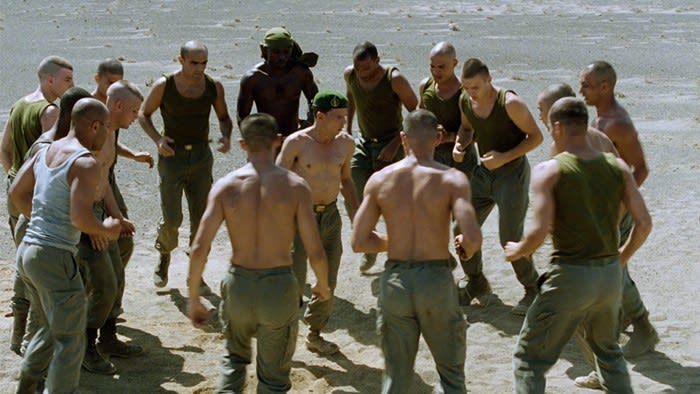Directed by Claire Denis
France, 1999
On rare occasions a film transcends its medium. Beau travail is such a film. Superficially a story about the French Foreign Legion, a tale of jealousy and violence in the desert, Claire Denis has given us a work of art with dance as the thread running through it and a heightened sensibility that reads like lyric poetry.
No other artform is as simultaneously trivial, vulgar and sublime as cinema - Claire Denis
Beau travail is loosely based on Billy Budd, Sailor, the unfinished novella by the author of Moby Dick, Herman Melville. Sergeant Galoup (Denis Lavant) lives in Marseille having been dishonourably discharged from the Legion. From there he recounts the events leading to his expulsion from his posting in Djibouti in the Horn of Africa. Galoup is second in command and the self-described ‘perfect legionnaire’. He deeply admires his commanding officer, Forestier, and life is good until the arrival of a new recruit who appears untroubled and far too at ease to be a legionnaire.
The Foreign Legion has traditionally provided a refuge for men with difficult pasts, often criminal. As Galoup notes ‘we all have a trashcan within’. This does not appear to be the case with Sentain (Grègoire Colin) and his popularity grows following his participation in a daring rescue. Forestier seems to love, or even lust after, him. Eaten up with jealousy Galoup feels supplanted from his role as the commander’s favoured son. He contrives a situation that allows him to discipline Sentain for insubordination. His punishment? Galoup banishes him to the desert with limited supplies and a faulty compass, seemingly leaving him to his death.
“We all have a trashcan within. That's my theory.”
Beau travail speaks to powerful themes: patriarchy, masculinity, the legacy of colonialism, but nothing is explicit. All is subtext. Djibouti gained independence from France in 1977 so what are the soldiers doing there? They have no real purpose and spend their evenings dancing awkwardly with the confident and self-possessed local women in a nightclub. By day, military life is rigid and methodical. The soldiers’ drills are elaborate, ritualistic and often physically intimate. Claire Denis pushes them to the point where the form becomes balletic. These sequences are spellbinding.
Denis Lavant, an actor known for his physically demanding and often acrobatic roles, gives us a blistering performance as the granite-faced Galoup. His internal conflict anchors the film. All of his actions, from making his bed to getting dressed are carried out with an increasing degree of precision, indeed tension: reflecting the winding up of a coiled spring that you know at some point will seek release.
The sound design is also worthy of mention. During the drills, there is little ambient sound – just the noise of bodies moving, gasping, breathing. This contrasts sharply with the bursts of soundtrack: a combination of Europop, Soukous and strikingly the surging sailors’ chorus from Britten’s operatic adaptation of … Billy Budd. Dialogue is sparse – mostly Galoup’s voiceover – leaving images and sound to drive the narrative. As that narrative unfolds the degree of tension, that word again, grows to a point where like Galoup’s jealousy it becomes overwhelming.
Agnès Godard’s cinematography is breathtaking. Beautifully composed landscape shots of the desert contrast with sequences of the men swimming together in the pellucid blue sea water. Light from the desert sun shimmers in the blazing heat. Highly stylised, she makes use of a blue and orange colour palette and long lens close-ups to linger on the faces of the cast challenging the viewer to read their thoughts and intentions. The grey-brown legionnaire uniforms are contrasted with the vibrant colours worn by the Djiboutians, who watch the soldiers with an amused detachment.
“Capturing bodies on film is the only thing that interests me”, Denis has said. She shows us a distinctly homoerotic world which is not something you would often associate with cinema’s depiction of the military, where men usually embody an iconic notion of masculinity. Denis strips away much of the classically masculine aspects of military life that mask the latent eroticism of the male space. As a female director, she is looking at this space through a particular lens and there is an unexpected and undoubted domesticity in the way the soldiers hang out their washing or do the ironing. Denis intentionally blurs and explores the traditional boundaries between male and female.
To discuss the film’s final scene would be an unforgivable spoiler but it has to be one of cinema’s great endings. Whatever you do, don’t switch off before the final credits roll … Corona’s 90s Eurodance hit ‘The Rhythm of the Night’ will stay with you for quite a while.
Reids’ Results (out of 100)
C - 70
T - 76
N - 76
S - 85
Thank you for reading Reids on Film. If you enjoyed it please share with a friend and do leave a comment.





On my list! A few months ago I read Beau Geste by P.C Wren some themes are overlapping but not explored so boldly. I saw the film ages ago with my dad, maybe you should consider it in your list
Sounds great will add to my watch list!